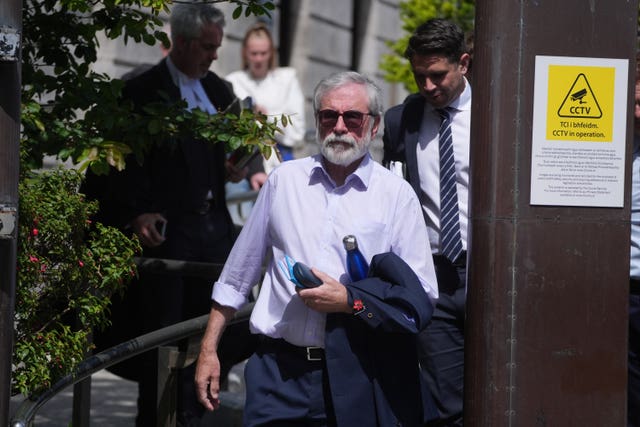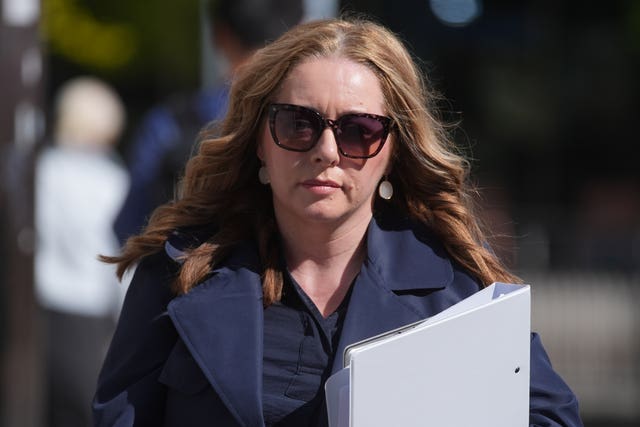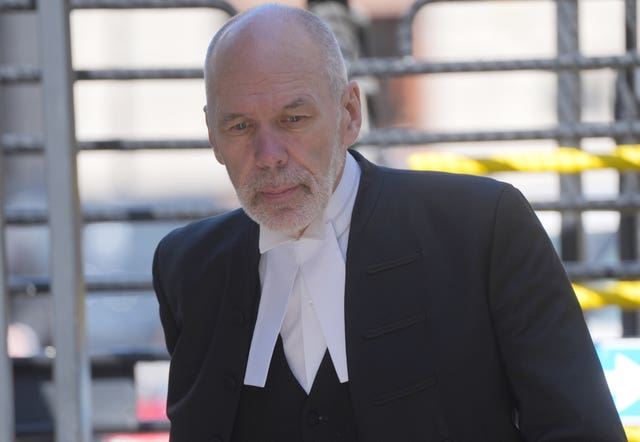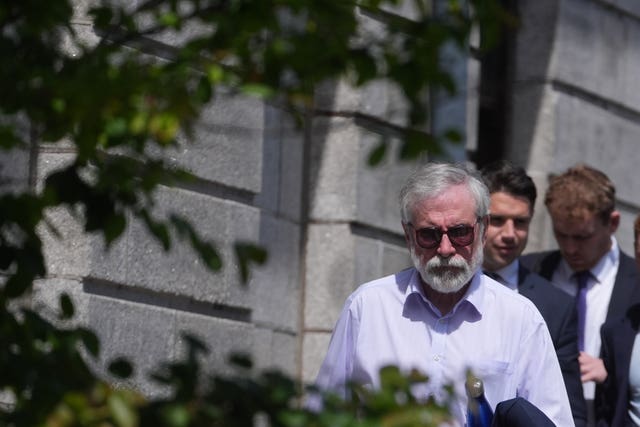‘Big sensationalist expose’ claim over Adams programme denied
A BBC Spotlight programme which aired a claim Gerry Adams sanctioned the killing of a spy was ‘measured and precise’.

A BBC editor has strongly rejected a view that a programme which aired a claim that Gerry Adams sanctioned the killing of a spy was a “big sensationalist expose”.
During a libel trial in Dublin, Declan Doyle SC, acting for Mr Adams, put it to the witness that the programme’s “big reveal” was a false claim that Mr Adams had sanctioned the murder of Denis Donaldson.
BBC Spotlight editor Gwyneth Jones said that was “absolutely not the case”, adding: “I don’t accept that characterisation of it for one minute.”
“The tone was measured, the language was precise. There was so much care taken over this programme. It was a solid piece of journalism and the result of many months work and a lot of diligence and a lot of rigour and a lot of scrutiny,” she said.

The exchange came during the trial at the High Court in Dublin.
Mr Adams has claimed that the BBC Spotlight programme, as well as an accompanying online story, defamed him by alleging he sanctioned the killing of Mr Donaldson.
He denies any involvement.
Mr Donaldson was shot dead in 2006, months after admitting he was a police and MI5 agent for 20 years.
In 2009, the Real IRA claimed responsibility for the killing, and the Spotlight programme was broadcast in September 2016 while a garda investigation into the matter was ongoing.
In the programme, an anonymous source identified as “Martin”, who says he was an informant for Special Branch within the IRA, claimed that the shooting was sanctioned by the political and military leadership of the IRA and that Mr Adams “gives the final say”.
The BBC has said the claim was corroborated by five other sources.
Ms Jones had been deputy editor of the programme at the time of the broadcast in 2016.
She said Jeremy Adams, who had been editor of the programme in 2016, had since left the BBC, lived outside the jurisdiction and would not be giving evidence in the case.
Asked about the online article and why it had not been taken down, Ms Jones said she saw no reason to, and the BBC is standing by its journalism.
“It came from the programme which was a very solid, very well researched, well considered, much scrutinised piece of significant public interest journalism,” she said.
Earlier, BBC reporter Jennifer O’Leary rejected assertions that she had “no regard or care” whether a claim that Mr Adams sanctioned the killing of a spy was true of false.
She said she did not treat the allegation “recklessly”, saying her journalism was carried out in “good faith”.
Under cross examination by Mr Adams’ barrister, Tom Hogan SC put it to Ms O’Leary that she did not make the allegation “bona fide”.
Ms O’Leary said that her journalism was carried out in good faith.

“The allegation was checked in good faith and in the public interest,” she said.
Mr Hogan said the allegation was made by the reporter “recklessly”, adding that she had “no regard or care if it was true of false”.
“I absolutely refute that assertion,” Ms O’Leary responded.
She also told the court that the allegation against Mr Adams was not a “single source” allegation.
She said she took the allegation seriously and met with reliable sources who “speak to it”, and not republicans who had animosity towards Mr Adams.
The investigative journalist said she avoided people who she knew had some sort of history with Mr Adams, and those who would be biased in what they said.
“I was careful and responsible. Was I supposed to ignore the allegation? It was in the public interest that it was in the programme but only if it was stood up,” she added.
Mr Hogan put it to Ms O’Leary that she was “just ticking boxes” when she was speaking to people about the allegation.

She replied: “Mr Hogan, I am a professional journalist, I wasn’t ticking boxes. I was doing my job in a professional way. It would be nothing without sources.”
However, Mr Hogan accused Ms O’Leary of setting about to find “yes men” who would corroborate the allegation.
“That is not the case,” the reporter rebuked.
She was accused of disclosing the allegation only to “disaffected” republicans and “indiscreet” security people.
“No, that is a wrong representation of the sources. I spoke to republicans who support the peace process, and have no animosity. I wasn’t going to any Tom, Dick or Harry to check the journalism.”
He went on to say that once she received the right of reply from Mr Adams, and “having ticked the boxes”, Ms O’Leary was able to publish “in the knowledge you never had to stand over the allegation”.
She said: “I don’t agree with the premise of that question. I absolutely can stand over the journalism. The way it is represented, that we can kick back and put our feet on table. That is not the way I operate.
“This is investigative journalism, it is rigorous and you get the gift of time.”

Ms Jones, editor of Spotlight, also gave evidence on Thursday.
Ms Jones, who has known Ms O’Leary professionally for 13 years, was asked by defence barrister Eoin McCullough SC to describe her work.
Ms Jones said her BBC colleague is “hard working, a grafter, very committed and passionate about her journalism”.
“She is someone who I think has a very good trait to be in investigative journalism, in that she will always play the devils advocate and she questions things.
“She is curious. Her work was to a very high standard.”
The trial continues.





